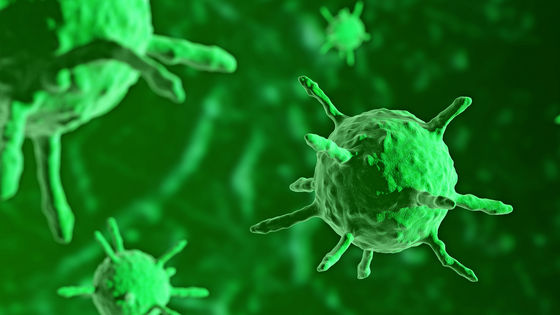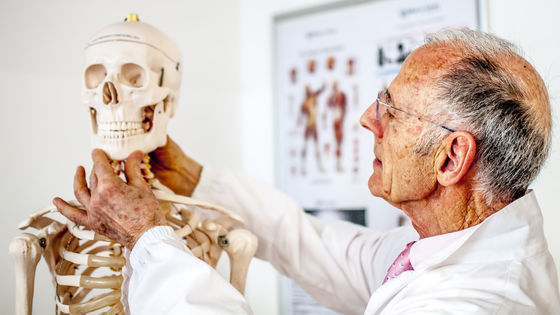What are the 'three evolutions' that are currently taking place in humankind?

By
Humanity has evolved over the years to adapt to the environment. One theory states that human evolution has already stopped, but 'Three aspects of humanity are still evolving,' says Inverse writer Sarah Throat.
Humans are still evolving: 3 examples of recent adaptations
https://www.inverse.com/mind-body/humans-still-evolving-3-recent-adaptations
◆ 1: Decrease in average body temperature
In 1868, a German doctor set 98.6 degrees Fahrenheit (about 37 degrees Celsius) as the standard for normal human body temperature. Since then, an average body temperature of 37 degrees Celsius has been generally accepted; fever is present if the temperature is above 37 degrees Celsius, and hypothermia is determined if the temperature drops significantly.
However, a study published in January 2020 suggested that humans' average body temperature was less than 37 degrees Celsius and likely to be 97.9 degrees Fahrenheit (about 36.6 degrees Celsius). The team also analyzed medical records for the last 200 years, including temperature measurements, and found that average body temperature dropped by about 0.05 degrees every 10 years.

By
According to Julie Parsonette, a professor of medicine at Stanford University, who conducted the study, 'The decrease in average body temperature is likely to be related to reduced global inflammation and improved living standards. Many of the infections caused chronic inflammation, which increased human metabolic rate and body temperature. ' Mr. Personnet speculates that the change may have been reflected in body temperature, as infectious diseases declined over time.
In addition, the emergence of air conditioners such as air conditioners has made it possible to live comfortably indoors, which may have a significant effect on human average body temperature. Although it is likely that healthy living is causing a decrease in average body temperature, it is not known whether a decrease in average body temperature will improve human health.

By
◆ 2: Gene changes
In 2016, a study on the FADS2 gene was published as a study to support genetic changes. The FADS2 gene can change depending on how much food you eat, such as meat and plants, and in Pune, India, the frequency of mutation of the FADS2 gene increases when you continue vegetarian diet for generations Was revealed. The mutation is said to have made it possible to convert ω-3 and ω-6 fatty acids into components essential for brain health.
At the same time, the genes for lactose intolerance have changed. Thousands of years ago, only children had the enzyme to prevent upset from drinking milk, and it disappeared as adults. However, gene mutations that occurred between 2000 and 20,000 years ago have allowed people to grow up with tolerance to dairy products. According to the estimates of researchers, that in East Africa have occurred changes in the genes for lactose intolerance to 3000 years ago, survey results there is, you can keep a cow has come to occupy a large part of human life Is the cause.

By
The transition of human life from nomads to farmers and from farmers to industry workers often drives genetic variation. As another example, a study published in 2010 found a link between living in urban areas and improving resistance to tuberculosis. Genetic evolution of tuberculosis resistance is likely to have occurred within the last 8,000 years.
'Before agriculture settled, humans were at risk of what is now an opportunistic infection . And most of the resistance to pathogens is genetic, so natural selection is likely to take place. ' According to the change in the style of living in cities in human society, diseases that threaten humanity are also changing.

By claudioventrella
◆ 3 : Bone
Human bones are weaker and less dense than their ancestors, about 10,000 years ago. A 2015 study estimates that human bones began to weaken about 12,000 years ago, when people started farming. It has been speculated that hunting has decreased due to the establishment of agriculture and livestock breeding has taken root, and the need for heavy and durable bones has been eliminated, making the skeleton lighter and more brittle.
A 2014 study also concluded that human bones have weakened since the establishment of agriculture. This study also claims that reduced physical activity was the cause of reduced bone strength. Researchers have also stated that one of the causes was reduced mobility due to settlement, suggesting that bone weakness due to reduced physical activity is likely to continue in the future.
A team from Colin Shaw, a researcher at Cambridge University who conducted the research, said that `` naturally human bones have the potential to exert as much power as orangutans '', but human bones I do not know if will evolve strongly again.

By pixelaway
Some scientists make the hypothesis that 'human inventions have dramatically improved the speed of evolution.' 'One thing I can say for sure, regardless of whether breakthroughs occur, is that biology will never end,' says Throat.
Related Posts:







